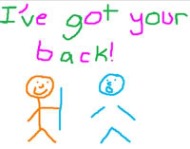 Relationships - Covering One's Back[/caption]
Relationships - Covering One's Back[/caption]I read two interesting books recently by former Navy SEAL Marcus Luttrell. The titles were “The Lone Survivor” and “Service.” Luttrell writes eloquently about the most powerful attribute of a SEAL, that of being a part of a team. During training, SEALS have a designated partner. They will never be more than an arm’s length from their partner. Throughout their SEAL career, they are confident that someone has their back – someone who will die for them if necessary.
I was reminded of “Band of Brothers” by Stephan Ambrose. Some members of Easy Company, 506th Regiment, 101st Airborne after D-Day went AWOL back to the Company from hospitals in England before their injuries were healed. Why? Army policy said that injured soldiers were to be attached to replacement companies upon their detachment from the hospital. The brothers would rather go back into war with unhealed injuries than go back into war in a brand-new company because they couldn’t trust the new recruits to “have their backs” like Easy Company would.
Four Important Words - "I've Got Your Back"
They are perhaps the most important words you can say in any relationship. They give your partner great freedom and protection.
What those four words could mean to your spouse
Those words imply great love, great trust, and great commitment. Your spouse will be free to grow and explore their life both inside and outside the relationship. You’re saying that you will be their best interests above your self-interests. You’re saying that nothing in their past can rise up and hurt them because you've got their back. You’re saying that you will continue to love them if they make mistakes. You’re saying that you’ll forgive and move forward with them.
What those four words could mean to your children
You give them the freedom to react to the roadblocks of life knowing that mom or dad will stand up with them. I made serious mistakes years ago because I tried to prepare the way for my sons rather that giving them the privilege of learning how to solve their own problems.
True story (names are changed): Brian (5th grade) came home several days from school in a bad mood. Finally his dad got it out of him that Robert (long time friend) was really hassling him at school. Dad suggested telling the teacher or going to the principle. Brian rejected both because of the teachers knew about it and weren't doing anything about it. Finally, dad told Brian to clearly tell Robert to stop; and if he didn't Brian had permission make him stop.
Brian objected again because he would be suspended from school for fighting. Dad told Brian that if it took fighting to make Robert stop, he would back Brian in whatever happened. End of discussion.
Several days later, dad noticed that Brian was his old happy self. He asked him about Robert. Brian simply smiled and said, “I took care of it.” Dad still doesn't know, 25 years later, what happened to resolve the problem.
The point – Dad, in effect, told Brian, “ I've got your back.” In doing so, he gave Brian the freedom to solve a problem himself.
We can’t protect our kids from the world without running the risk that they won’t learn how to live in it. We just have to “have their backs.”
What if you can’t say those four words
All kinds of negative things can make it impossible to commit to “having someone’s back.” Think about the strength and fulfillment you can bring to any relationship if you take those negative emotions under control. You have peace and strong relationships to gain and nothing to lose.
We can show you ways to do that. Think about it!
www.findingpersonalpeace.com
Thanks for reading our blog today. I invite you to respond in several ways: (1) Comment in the space below if you agree or disagree with what I've said. A dialogue could be interesting for all; (2) Share the post with your friends. There are buttons below for Facebook, Twitter, and other social media sites; and (3) sign up for an email with each new post. There’s a place to do that on the right. Then you won’t have to remember to look for subsequent posts. Thanks again!
No comments:
Post a Comment